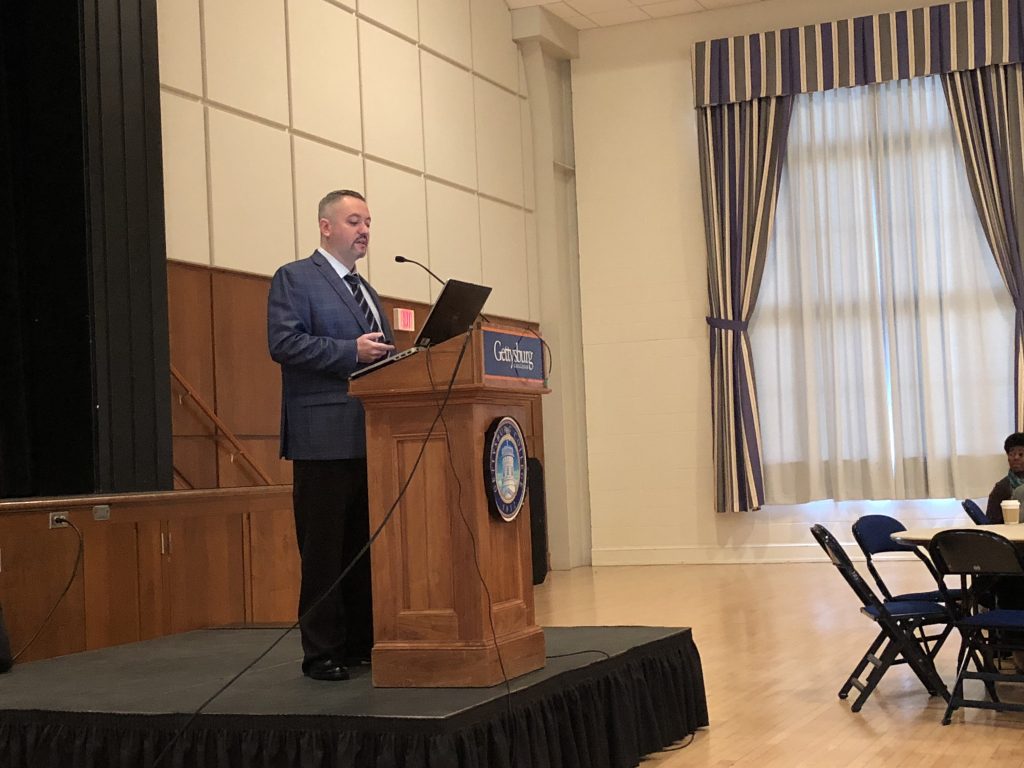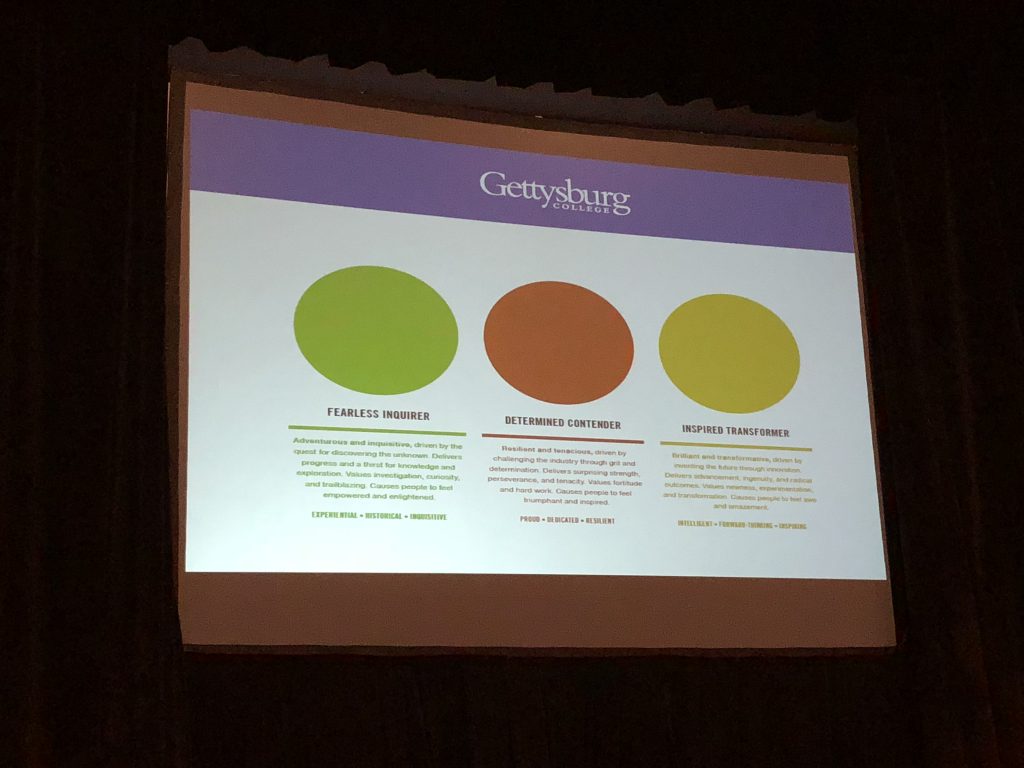
David Viggiano, a senior strategist at Dartlet, presented the results of a market study to the campus community at an event held Nov. 29. (Photo Jamie Welch/The Gettysburgian)
By Jamie Welch, Editor-in-Chief
Gettysburg College exists to “inspire passionate curiosity that pursues aspirations and engaged global citizenship,” new market research presented to the college Wednesday has found. The research also found that the “human that is Gettysburg College” is a fearless inquirer, a determined contender and an inspired transformer.
The study was conducted by Dartlet, a reputation and research strategist that was retained by the college to discern the college’s “human personality” and develop communications and marketing strategies for the college to use as the college prepares to design a new website.
The goal of the research, an advertisement read, was to “unpack the College’s traits, faults, and truths” to “help the College define ‘who we are’ as an institution.” To achieve this, Dartlet conducted workshops with 614 people including students, faculty, staff and alumni. Additionally, Dartlet administered surveys to residents in key target markets identified by the college such as New York City and Philadelphia.
“We didn’t just come and do a focus group, we came and listened to as many people as we possibly could,” said David Viggiano, a senior strategist at Dartlet. “And what that does it really give us a really strong sense of understanding with all those voices in the process and really gives us compounding data points,” he continued.

Gettysburg College’s “authentic personality” (Photo Jamie Welch/The Gettysburgian)
In addition to positive personality traits, Dartlet also examined what they call “Death Stars,” or traits that workshop participants felt were inaccurate, untrue, unattainable, or were simply disliked. Death Star words were originally cited as accurate descriptors of Gettysburg College.
One of the traits identified by Dartlet as a Death Star was “inclusive.” Excerpts provided from workshop discussion included phrases like “Greek Life is underlying exclusive and socially selective” and “I think there is a certain aspect of elitism on campus that oftentimes can be or feel exclusive.”
Others said the college is behind the curve, with one participant accusing the college of being slow to make changes and another saying, “we never lead, we react.” “Charitable” was also identified as a Death Star, with one participant commenting, “the college is also very focused on money in a way that I think detracts from the learning experience.”
Dartlet recommended that the college be more extroverted, more aggressive and be more willing to take risks.
“You’re saying ‘ideally we’re going to be this brilliant and transformative type’ and in order to be that, in order to express that, and in order to make decisions as a community and as an institution that reinforces that, you have to be more progressive,” Viggiano said.
In addition to the personality assessment, Dartlet examined how Gettysburg College’s communications and marketing stack up against its competitors. Gettysburg scored a B- in the competitive audit, with Dickinson College also scoring a B-, Franklin and Marshall College scoring a C- and Bucknell scoring an A.
See the full results of the competitive audit
| Competitive Audit Results | ||||
|---|---|---|---|---|
| Institution | Grade | |||
| Gettysburg College | B- | |||
| Dickinson College | B- | |||
| Franklin and Marshall College | C- | |||
| Connecticut College | A | |||
| Muhlenberg College | C | |||
| Union College | A- | |||
| Skidmore College | B+ | |||
| Bucknell University | A | |||
| Colgate University | C+ | |||
| Lafayette College | A- | |||
| University of Richmond | D | |||
“We would say that Gettysburg College is sort of, in terms of tone and style and output, playing it a little bit safe there in the middle ground,” Viggiano said.
Viggiano expressed discontent with the complete lack of historical messaging in the college’s marketing.
“You are on hallowed ground here in terms of your historical past,” Viggiano said. “You have three of your competitors who are using ‘history’ and ‘historical’ as a key word, a very important theme in the marketing that they’re expressing, and it is completely absent from the marketing and what’s being expressed by Gettysburg College.
“And we think it is incredibly unique…you stand on the hallowed ground of your historical past, and you are looking at how to use that history to inform the future,” he continued.
While the research showed that 47% of Gettysburg’s perceived personality was based in the “friendly/provider” archetype, Viggiano doesn’t believe that that is a true representation of Gettysburg’s personality.
“[Friendly/provider] is certainly something we evaluated very closely because there is [friendly/provider] to some degree represented here,” Viggiano said. “But what we found is as we looked at how you defined what we typically call those [friendly/provider] traits, you were defining them in ways that really made them [discoverer] or [contender], not necessarily [friendly/provider].”
“Words like diversity, which are typically [friendly/provider] and yet you’re describing it in terms of… experiencing diversity, not just bringing diversity here, but being a part of it and experiencing it, and how does that lead you to be a better person…a better institution,” Viggiano said. “We would tell you that these inquisitive, adventurous, green characteristics are what help you deliver positive impact on the world, and we think you should be screaming them from the hilltops because it is an authentic part of who you are as institution, and your history is a big part of that.”
After the research presentation, Dartlet led a workshop that, according to an invitation sent to the campus community, was designed to help college employees “weave these findings into [their] work.”
Workshop attendees sat in small groups and were given the task of writing a sample introduction to a prospective student, and then a follow-up email to that same student. Dartlet provided a “messaging guide” that promised to tell the reader how to “harness Gettysburg College’s story to write your own on-brand messaging.”
The process to craft a successful, on-brand message, according to Dartlet, begins by getting into character.
“Gettysburg College is a singular human being with one voice-not a fragmented split personality that people can’t recognize,” the document reads in part.
Step two is to “list your evidence.” This could be a fact, event, detail, person or place that is the crux of the message you are trying to create.
Step three is to map the selected piece of evidence to one or two dimensions. These dimensions are designed to offer relevant connections between the evidence and the broader storyline.
Step four is to use the chosen dimensions to find the corresponding storyline that will be used in the messaging. According to Dartlet, each storyline is weighted toward certain characteristics of Gettysburg College’s personality.
The final step is to gather everything together and craft a message using the “laddering technique”. This involves either going “up the ladder” by listing evidence, followed by an elevation to the dimensions, followed by an elevation to the broader storyline, or going “down the ladder” by crafting your messaging using the elements in reverse order.
The technique is harder to master than it seems. One high level administrator presented his mock conversation with a prospective student, offering an anecdote about an alumna who did great things at Gettysburg College and now works at ExxonMobil. He was interrupted by Scott Ochander, co-founder of Dartlet.
“This is a great example of what I was talking about,” he said. “You were listing a lot of evidence…but you never elevated it to the story.”
Vice President of Enrollment and Educational Services Barbara Fritze assured attendees that this is not the last they would hear of the work done by Dartlet.
“This isn’t one and done,” Fritze said. “We’re going to come back to and be able to really review it again and again from a divisional standpoint. And then the Faculty and Student Enrollment Retention Committee will also be looking at this from a faculty perspective to make sure that they’re the champion of this as we move forward.”
